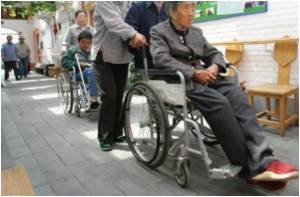A new study says that group appointments where doctors see several people for a longer time may be feasible for Parkinson's disease.

The randomized, controlled study compared people receiving their normal care from a physician to people receiving care through group visits with their regular physician over one year. Caregivers were also included in the study.
Those receiving their usual care had 30-minute appointments with their physicians every three to six months. The group visits lasted 90 minutes and were held every three months. They included introductions, updates from patients, and an educational session on a topic chosen by the participants. Time was allotted for questions from patients or caregivers and individual 10-minute appointments with the physician were scheduled for before or after the group visit for individual concerns.
Of the 30 study participants, 27, or 90 percent, completed the study, along with 25, or 93 percent of the 27 participating caregivers. At the end of the study, there was no difference between those receiving usual care and those participating in the group visits in how they rated their overall quality of life.
Participants were asked whether they preferred the group visits or usual care at the end of the study. Of the 14 receiving group visits who responded, eight preferred the group setting, five preferred usual care, and one was indifferent. Of those receiving usual care who responded, five preferred group visits, six preferred usual care, and three were undecided. None of the participants reported any confidentiality issues.
Study author E. Ray Dorsey, MD, MBA, of Johns Hopkins University School of Medicine in Baltimore, MD, and a member of the American Academy of Neurology, said group visits have the potential to address limitations of support groups and traditional doctor visits.
Advertisement
Dorsey noted that group visits may pose logistical issues, such as the need for a large room and scheduling difficulties. He said that the risk that the lack of a one-on-one examination could lead physicians to miss subtle problems could be resolved by using a hybrid model alternating group and individual appointments.
Advertisement
Source-Eurekalert











